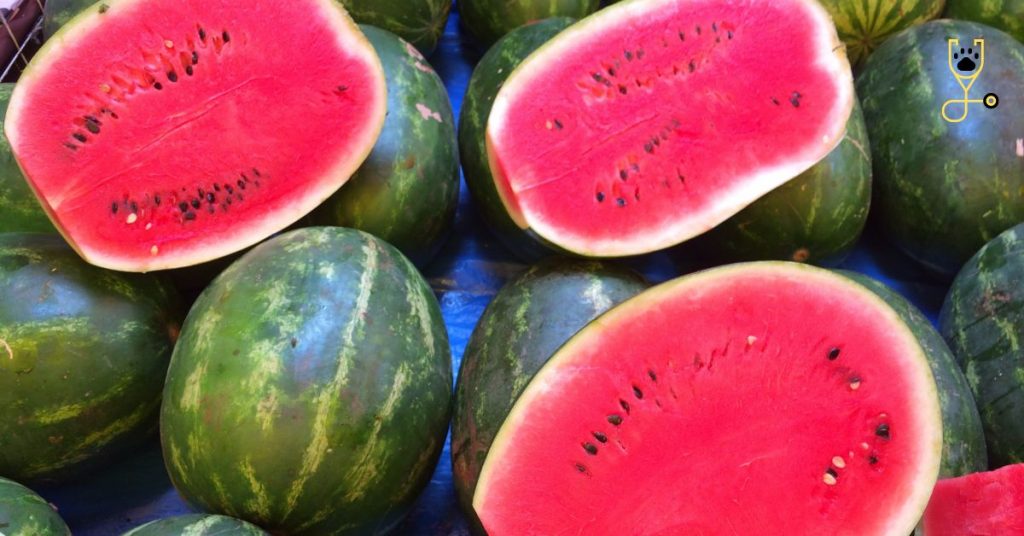Summer is in full swing and that means one thing for horse owners-watermelon season! There are many benefits to feeding watermelon to your horse, but there are also some risk factors you need to be aware of. In this blog post, I’ll discuss both the pros and cons of feeding watermelon to your horse. So, whether you’re already incorporating this delicious fruit into your horse’s diet or are thinking about doing so, read on for all the details!

Nutrients In Watermelon(%)
- Vitamin A: 1.4
- Vitamin C: 20.7
- Calcium: 0.1
- Iron: 0.2
Pros of Feeding Watermelon to Your Horse
Feeding watermelon to horses can provide them with a range of vitamins and minerals that are beneficial for their health, including vitamins A and C, which help support healthy eyesight and immune system function respectively; calcium, which promotes strong bones and muscles; and iron, which helps maintain a healthy metabolism. Additionally, the high water content of watermelon can help keep your horse hydrated during hot summer days. Furthermore, the sweet taste of watermelons is often appealing to horses and could make feeding time more enjoyable for both you and your horse!
Cons of Feeding Watermelon to Your Horse
Though watermelon does provide a range of nutritional benefits for horses, there are still some risks associated with feeding it. For example, the sugar content of watermelons can be fairly high, so you should limit the amount you give to your horse each day. Additionally, since watermelons have high fiber content, they may cause digestive issues if not adequately chewed before swallowing. Finally, as with any treat food item for your horse, you should feed in moderation and avoid overfeeding as this could lead to weight gain and other health problems.
10 Major benefits of feeding watermelon to your horse
1. It’s packed with vitamins and minerals – Watermelon is full of antioxidants, potassium, vitamin A, B-complex vitamins, and magnesium – all important nutrients for keeping your horse healthy.
2. It can help reduce inflammation – The Vitamin C in watermelon is known to help reduce inflammation which means it can be beneficial for horses with arthritis or other joint pain.
3. Low sugar content – Although there is the sugar present in watermelon (it IS a fruit!), the amount is relatively low compared to some other fruits like apples and bananas, making it suitable even for horses with sensitive stomachs.
4. High water content– Watermelons are made up of 92% water which makes them an excellent source of hydration for your horse.
5. Natural electrolytes – Electrolytes are important for keeping a horse healthy and replenishing those lost during exercise. Watermelon is an excellent source of sodium, potassium, chloride, and magnesium which all help to maintain proper balance in the body.
6. Easily digestible – The soft texture and high water content make this fruit easily digested by horses with sensitive stomachs or digestive issues.
7. High in fiber – Fiber is essential for maintaining good gut health and can also help keep your horse feeling full longer after eating meals.
8. Low calorie – Watermelons are low in calories meaning they won’t contribute too much to weight gain in horses prone to obesity!
9. Versatile – Watermelon can be fed as a snack, used in treats, or even put into salads and smoothies.
10. Delicious – Last but not least, they taste great! Horses love the sweet flavor of watermelon which makes it an ideal treat for them to enjoy.

Risk Factors of Feeding Watermelon to Your Horse
1. Too much sugar– Although watermelons are lower in sugar than some other fruits, too much can still cause digestive problems and weight gain in horses prone to those issues.
2. Toxic rinds- The green rind contains toxins that can lead to colic if eaten by your horse so it’s important to make sure you remove all traces before feeding.
3. Choking hazard – The seeds can present a choking hazard so it’s important to remove them before feeding your horse watermelon.
4. Allergic reaction– Some horses may have an allergic reaction to certain fruits including watermelon, so make sure you are aware of any allergies they may have before introducing this treat into their diet.
5. Poor nutrition – Watermelon alone isn’t enough to provide a balanced diet for your horse and should only be used as an occasional snack or treat!
6. Unsuitable for horses with laminitis – Due to the sugar content, watermelon is not recommended for horses with laminitis or other metabolic conditions.
How To Feed Watermelon To Your Horse
Before feeding your horse any type of food, it’s important to check with your veterinarian first. Watermelons are generally considered safe for horses, but some may have allergies or digestive issues that could be aggravated by certain foods like watermelon.
Once cleared by the vet, you’re ready to start feeding! Start by washing off the outside of the fruit thoroughly – since horses tend to have sensitive skin, it’s important that there isn’t any leftover dirt or debris on the surface.
Cut the watermelon into cubes or slices – depending on your horse’s preference, you can make them as big or small as you need. Make sure that any of the seeds are removed before feeding, as these could be a choking hazard for your horse.
Your horse will likely enjoy eating the watermelon straight from your hand or by dropping it onto the ground in front of them. You can also feed it to them using a hay net or even mix it into their regular food. Whichever way you choose, have fun and watch your horse enjoy this delicious treat!
When finished, make sure to take away any leftover pieces of fruit and dispose of them properly so that there is no risk of your horse eating them.
Feeding watermelon to your horse is a great way to provide them with a healthy snack and keep them hydrated during hot summer days. Plus, you can have fun watching them enjoy this tasty treat! So go ahead and give it a try – you won’t be disappointed!
So there you have it – the perfect guide for feeding watermelon to your horse. Have fun and keep cool this summer with some delicious watermelon snacks for your beloved equine friend! 🙂

Conclusion
Watermelon is a great snack to provide your horse with a nutritious treat that they can enjoy. However, it’s important to take precautions when feeding watermelon and consult your veterinarian before introducing it into their diet. Make sure to remove any seeds or rinds before providing the fruit as these could be choking hazards also monitor their intake as too much sugar can contribute too much to weight gain in horses prone to obesity! With some proper care and attention, you and your horse can have a fun summer filled with delicious watermelon snacks. Enjoy!
Frequently Asked Questions
1. Is watermelon good for horses?
Yes, watermelon is a great snack to provide your horse with a nutritious treat that they can enjoy. However, it’s important to take precautions when feeding watermelon and consult your veterinarian before introducing it into their diet.
2. Is watermelon safe for my horse?
Watermelons are generally considered safe for horses, but some may have allergies or digestive issues that could be aggravated by certain foods like watermelon. Make sure to check with your vet first before introducing any new food into the diet of your horse.
3. Are there any risks associated with feeding watermelon to my horse?
Yes, there are certain risks associated with feeding watermelon to horses. Make sure to remove any seeds or rinds before providing the fruit as these could be choking hazards also monitor their intake as too much sugar can contribute too much to weight gain in horses prone to obesity! With proper care and attention, you and your horse can have a fun summer filled with delicious watermelon snacks.
4. What’s the best way to feed watermelon to my horse?
Your horse will likely enjoy eating the watermelon straight from your hand or by dropping it onto the ground in front of them. You can also feed it to them using a hay net or even mix it into their regular food. Whichever way you choose, have fun and watch your horse enjoy this delicious treat!
5. How often can I feed watermelon to my horse?
It’s generally recommended to limit the amount of watermelon you feed your horse in a single sitting. You can offer it as a special treat during hot days or mix it into their regular food for an added boost of hydration and nutrition. However, it’s important to consult your veterinarian if you are unsure about how much watermelon to feed your horse.
6. Is there anything else I should know before feeding watermelon to my horse?
When finished, make sure to take away any leftover pieces of fruit and dispose of them properly so that there is no risk of your horse eating them. Feeding watermelon to your horse can be a great way to provide them with a nutritious snack, but it’s important to keep safety in mind as well!
Now that you know the basics of feeding watermelon to your horse, have fun and enjoy watching them indulge in this tasty treat! With some proper care and attention, you and your horse can have a great time this summer with some delicious watermelon snacks! Enjoy!
Happy snacking! 🙂





